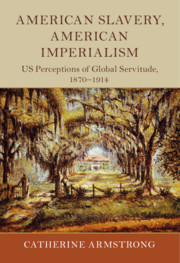Book contents
- American Slavery, American Imperialism
- Slaveries since Emancipation
- American Slavery, American Imperialism
- Copyright page
- Contents
- Figures
- Acknowledgements
- Introduction
- 1 A Rhetorical Continuum? How Representations of Antebellum Slavery Endure in Post-War Culture
- 2 Global Contexts: How External Factors Drive US Perceptions of Slavery
- 3 Othering the Slave Owner
- 4 Othering the Enslaved
- 5 Gender and the Rhetoric of Slavery
- 6 Resistance and the Slavery Counter-Narrative
- Conclusion
- Bibliography
- Index
Conclusion
Published online by Cambridge University Press: 17 August 2020
- American Slavery, American Imperialism
- Slaveries since Emancipation
- American Slavery, American Imperialism
- Copyright page
- Contents
- Figures
- Acknowledgements
- Introduction
- 1 A Rhetorical Continuum? How Representations of Antebellum Slavery Endure in Post-War Culture
- 2 Global Contexts: How External Factors Drive US Perceptions of Slavery
- 3 Othering the Slave Owner
- 4 Othering the Enslaved
- 5 Gender and the Rhetoric of Slavery
- 6 Resistance and the Slavery Counter-Narrative
- Conclusion
- Bibliography
- Index
Summary
Within the United States, the years from 1865 to 1920 represent a period during which the various understandings of the notion of slavery evolved and simultaneously became more entrenched and important within the political culture of the nation. The influence of both abolitionist (of moderate and radical hues) and proslavery discourses, that had their origins in the pre–Civil War era was marked, but there was also a new conception of the changing definition of slavery in a global context. In both domestic and global situations, it was difficult for commentators to overcome the era’s pervasive racial and gender ideologies, meaning that during this period even antislavery discourse had a strongly conservative, reactionary tone and message. However, radical antislavery rhetoric increasingly became a part of the intellectual world of the early twentieth century, challenging traditional hierarchies and, in some cases, the entire capitalist system itself.
- Type
- Chapter
- Information
- American Slavery, American ImperialismUS Perceptions of Global Servitude, 1870–1914, pp. 269 - 275Publisher: Cambridge University PressPrint publication year: 2020



